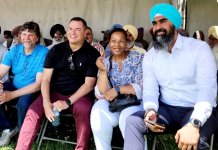Brampton Focus recently spoke with Suzanne Nurse, the Peel District School Board Vice-Chair and Trustee for Brampton Wards 2 and 6 about the We Rise Together Action Plan and Conference. You can also Watch our video interview earlier in the school year.
The Peel District School Board’s school year is coming to a close and though the summer months mean classrooms are empty, planning conversations “will definitely be taking place over the summer months,” according to Nurse.
We Rise Together Conference
“You had to be in the room to really feel the energy that was there. It was an incredible experience,” Nurse said of the conference where she attended as both Vice-Chair of the Board, Trustee and a Mom of a young attendee. “First and foremost I’m a Mom. The other side of it is that as a trustee you hear the issues.”
When asked how the Conference focused on student experiences, Suzanne noted, “The best part about the conference was that you heard their voices and those student voices also created that entire Action Plan. Having them heard throughout the course of the day about some of the things they’ve experienced at school was important.”
“We gave them backpacks that said, ‘We Rise Together’ so they could be going anywhere in the Region, see someone with their backpacks and connect after the fact.”
 When asked about the next steps after the conference, Nurse said adequate follow-up after the conference was a priority because, “now it’s a matter of making sure we don’t lose the students. We need to make sure that this stays at the forefront to act on our promises.”
When asked about the next steps after the conference, Nurse said adequate follow-up after the conference was a priority because, “now it’s a matter of making sure we don’t lose the students. We need to make sure that this stays at the forefront to act on our promises.”
The Reality
The Report shed light on the fact that “Black youth feel isolated and marginalized in school due to: low expectations; the absence of Blacks and Black culture in the curriculum; a low number of Black teachers; receiving more encouragement to engage in sports than academics; being streamed away from math, science, and academic level courses; receiving harsher discipline than non-Black students; and the presence of police in schools.”
It’s clear why the We Rise Together Conference and more inclusive actions this school year are a priority. The Board’s values on the website state, “We respect differences, and treat everyone fairly and equitably- we are inclusive,” while the report revealed there is still much work to be done, so this work will need to be on the minds of educators going into their planning season.
Brampton resident and parent, Kevin Montgomery expressed that, “As a parent of white students in Peel schools, I need to make sure my kids are aware of how to spot systemic racism as best as I understand it. And if in doubt, ask.” He emphasized further that, “a person’s perception infers their reality. This is real for Black students.”
Community Criticisms
Critics may argue that recognizing racialized experiences doesn’t serve students and that it’s important to be “colorblind” in classrooms, to which Nurse pointed out, “Sometimes people say they don’t see race which is doing students a disservice. You need to at least have a respect for the histories that they’re bringing into the classroom or else you can’t teach them. You don’t know what that child has experienced.”
Nurse agreed that dismissing racialized experiences because some don’t “see” race, allows unconscious biases to go unchallenged while letting us off the hook to recognize and organize around fighting systemic racism. She also noted, “Many people don’t want to accept that they may have their own biases”.
She also addressed criticisms that not enough is being done to address anti-Black racism in schools. “We had two community consultations about the report. If people feel we’re not doing enough, it’s a symptom and we can’t be upset. The Black community has been studied and theorized so much that we shouldn’t be surprised people are skeptical.
“It puts more onus on us to take that document and turn it into something real. Their doubts about it just fuel me more, that we have to do this work. If they doubt that we’re going to do the work, I’m going to prove to you that we can and will.”
What’s next
Specific details about the next conference and how the Report will be implemented are forthcoming but Nurse did note that, “Teachers are now able to suggest ideas, knowing the Board will support it because of that Report.”
“We’re looking at opportunities for teachers to bring African history into everyday things as simple as math. Pythagorean theorem for example, is Egyptian and therefore African. We haven’t been able to do those things with our students in the past.
 “Increasing our resources at our central library at our Board office is another priority, which will bring them into the system for schools and students. This means more resources around Black History that don’t deal with slavery.”
“Increasing our resources at our central library at our Board office is another priority, which will bring them into the system for schools and students. This means more resources around Black History that don’t deal with slavery.”
When asked what those without children in the school board can do to help, Nurse gave the community homework this summer, “Keep the conversation going. I think people believe this issue is so difficult to tackle that they avoid it altogether.”

















